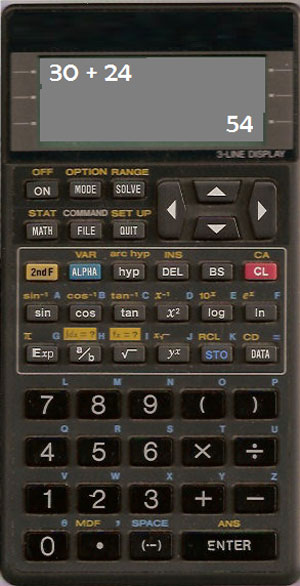When you need to solve a word problem, you should:
- Read the problem.
- Write down all the information that the problem gives you.
- Write down what the question is asking you to do.
- Use clue words in the problem to make a plan to solve the problem.
- Write your plan as an equation.
 In this section we will cover one of the most important steps in problem solving. Whenever you get an answer to a problem, you should think about what the answer means and whether or not it is reasonable. Ask yourself:
In this section we will cover one of the most important steps in problem solving. Whenever you get an answer to a problem, you should think about what the answer means and whether or not it is reasonable. Ask yourself:
Based on the problem I just solved, does my answer make sense?

Johnny is 24 years younger than his dad. If Johnny's dad is currently 30 years old, how old is Johnny?
Attempted Solution:
Given: Johnny's dad is 30
Question: How old is Johnny?
Plan: I should subtract 24 from Johnny's dad's age to find Johnny's age
Equation: J = 30 – 24
Calculator:

Modified from: SharpEl-5120, EpiVictor, Wikimedia Commons
Answer: J = -21
- Is this answer reasonable?
- Why or why not?
- Can you find where the mistake happened?
The first factor to consider is whether or not the answer to the problem is physically possible.


 Beth is at a store shopping for a television. The price of the television that she wants to buy is $897.43. The mounting bracket for the television costs $101.99, and the charge for installation is $199.74. Beth does some quick mental math and decides to spread the payments out over a year–making 12 equal payments. She estimates that her monthly payment will be $100.00. Is this a reasonable estimate of the amount for each payment?
Beth is at a store shopping for a television. The price of the television that she wants to buy is $897.43. The mounting bracket for the television costs $101.99, and the charge for installation is $199.74. Beth does some quick mental math and decides to spread the payments out over a year–making 12 equal payments. She estimates that her monthly payment will be $100.00. Is this a reasonable estimate of the amount for each payment? Mr. Jones is working out a budget for household expenses. He looks at the monthly statement from his car insurance, and he sees that he pays $119.00 every month. Based on this information, he budgets $1200.00 for car insurance for the year.
Mr. Jones is working out a budget for household expenses. He looks at the monthly statement from his car insurance, and he sees that he pays $119.00 every month. Based on this information, he budgets $1200.00 for car insurance for the year. Susan babysits for several families. The different families pay her between $8 - $10 per hour. Last month she babysat for a total of 30 hours. Which of the following is a reasonable amount that she could have been paid for the month?
Susan babysits for several families. The different families pay her between $8 - $10 per hour. Last month she babysat for a total of 30 hours. Which of the following is a reasonable amount that she could have been paid for the month?